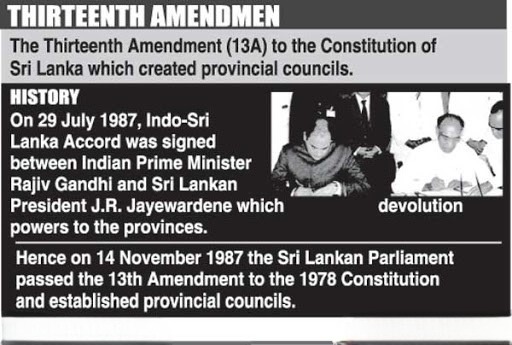TNA categorically rejects Ranil’s offer of devolution
Context
Ranil Wickremasinghe’s pledge to execute the 13th Amendment without granting police powers was “categorically rejected” on Tuesday by the Tamil National Alliance (TNA), who referred to it as “another hollow promise”.
What is the background behind the 13th Amendment?
- Indio-Srilanka Accord: Rajiv Gandhi, the prime minister of India, and J.R. Jayewardene, the president of Sri Lanka, signed an agreement known as the Indo-Sri Lanka Accord on July 29, 1987. By addressing the grievances of the Tamil minority, the pact sought to end the ethnic war in Sri Lanka.
- Devolution of Powers: The Indo-Sri Lanka Accord’s 13th Amendment was a key component. It suggested transferring authority from the federal government to provincial councils, giving the provinces some degree of regional autonomy and self-governance.
- Creation of Provincial Councils: the formation of provincial councils in Sri Lanka as a result of the change. These councils were to be elected by the residents of each province as representative entities, and they were to have authority over certain issues in their particular territories.
- Official Languages: The Thirteenth Amendment designated Tamil and Sinhala as Sri Lanka’s official languages, reflecting the nation’s multiethnic and multilingual makeup.
- Link Language: English was listed as a third language in the amendment along with Sinhala and Tamil, referred to as the “link language.” This meant that the central government and various linguistic communities would communicate using English as a common language.
- Adoption of the Amendment: On November 14, 1987, the 13th Amendment to Sri Lanka’s 1978 Constitution was adopted by the country’s parliament, effectively inserting its contents into the framework of the nation.
- Aims of the amendment: The Thirteenth Amendment’s main goals were to resolve the problems of the Tamil minority, advance regional autonomy, and encourage harmony and cooperation among various ethnic groups.
- Implementation challenges: Despite the amendment’s approval, it proved difficult to properly put its provisions into practice. Delegating authority over land, police, and finances to the provinces was a major concern because these sectors were essential for efficient local governance.
- Acceptance by All: The Sri Lankan government stressed the importance of the devolution framework being accepted by all regions of the nation. Given Sri Lanka’s complex ethnic, cultural, and political landscape, this was taken into account.
What is the current situation in Sri Lanka relating to the implementation of the 13th Amendment?
- Although the 13th Amendment has been in effect for more than 30 years, successive Sri Lankan administrations have never completely implemented it.
- President Ranil Wickremesinghe offered to put the 13th Amendment into effect but without giving the provinces police authority.
- The 13th Amendment’s main goal was to provide provincial councils more authority at the local level by transferring some federal government authority to them. The goal of this decentralization was to give the provinces more autonomy to decide on specific issues.
Why was the response by TNA ?
- Major political group representing Sri Lanka’s Tamil community, the Tamil National Alliance (TNA), has categorically opposed President Wickremesinghe’s proposal.
- According to TNA spokesperson M.A. Sumanthiran, if the government is unwilling to implement the 13th Amendment, which is now part of the Constitution, it demonstrates a lack of political will for true power devolution beyond this amendment.
- The TNA considers the President’s plan for growth and power devolution—which excludes police powers—to be yet another empty pledge.
What is the significance of the 13th Amendment?
- Devolution of Power: In Sri Lanka, the idea of devolution of power was first introduced by the 13th Amendment. It established provincial councils and outlined the process through which the federal government would delegate some authority to these local organizations. The goal of this devolution was to decentralize government and give provinces more authority to decide on issues that directly impact their regions.
- Ethnic conflict: Ethnic conflict in Sri Lanka has historically been resolved through politics, particularly between the Sinhalese and Tamil populations. To find a political resolution to the ethnic issue, the 13th Amendment was included in the Indo-Sri Lanka Accord in 1987. It attempted to meet the demands of the Tamil minority for more self-governance by establishing regional autonomy.
- Provincial Councils: The amendment allowed Sri Lanka to establish provincial councils. These councils have the power to decide on particular matters including local development, agriculture, health, and education within their respective provinces. Between the federal government and local governments, they act as a middle level of government.
- Minority Rights: By giving minorities a measure of political representation and self-governance, the 13th Amendment aims to preserve the rights of minority communities, especially the Tamils. It aimed to resolve the Tamil community’s longstanding issues of political exclusion and unfair treatment.
- International implications: The Indo-Sri Lanka Accord, which featured India’s intervention to arbitrate the conflict, was the cause of the 13th Amendment. Its implementation was essential for upholding India’s strategic objectives in the area and promoting healthy ties between the two close neighbours.
What are the challenges faced in implementing?
- Opposition: Nationalist movements have historically fought any perceived diminution of the authority and sovereignty of the central government in Sri Lanka. These organizations contend that giving more authority to the provinces could encourage secession or jeopardize the nation’s unity and territorial integrity.
- Security concerns: National security worries have been one of the biggest obstacles to fully executing the 13th Amendment. Giving the provinces police authority is particularly difficult because it raises concerns about how local authorities can utilize this authority in ways that could endanger law and order or national security.
- Lack of Political Consensus: It has proven challenging to reach a political agreement on the 13th Amendment’s implementation. Devolution of power is a topic on which many political parties and ethnic groups disagree, which frequently results in disputes and delays in the process.
- Financial Restrictions: Establishing and maintaining efficient provincial councils demands significant money when responsibilities are devolved to the provinces. Financial limitations frequently prevent these councils from operating effectively and restrict their ability to fulfil their prescribed duties.





